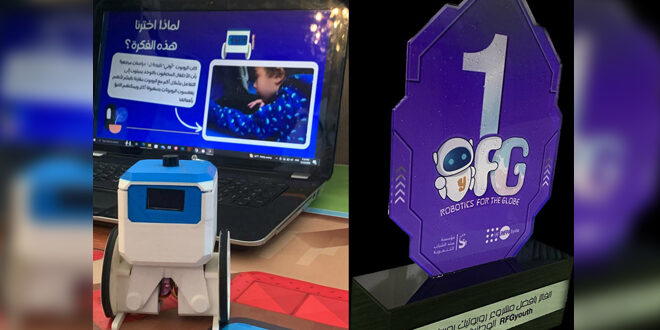In an attempt to delight children with autism spectrum disorder and impart information to them in an easy and attractive way, a student team from the Faculty of Informatics Engineering at Damascus University has created a special robot for this segment of children aged between 4 to 9 years.
Talking about the project, Iman Yaghi, a student at the Faculty of Informatics Engineering and one of the team members, said that the robot named “Oti” won the award for the best technical project within the national competition held by the “Sanad Youth Development Foundation” and supported by the United Nations Population Fund last year, pointing out that the robot has the ability to help children to do their routine tasks at home.
Yaghi added that the idea was based on reference studies stating that children with autism spectrum disorder tended to interact with robots more than with humans by 4 out of 5 children. On the basis of this study, the team members visited one of the learning difficulties centers, where they noticed the behavior of the children, and found that they tended to imitate robot movements, attracted towards them and interacted with them.
Yaghi added that the team then met with specialists and parents of children with autism to know more about the problems they are experiencing with their children, most notably the difficulty of performing their daily routine tasks alone, as they need a caregiver to be with them.
According to Yaghi, the robot consists of an interesting exoskeleton, three-dimensional printing, legs with attractive movement for the child, a screen showing emotions and emotional reactions, and a speaker responsible for encouraging sound effects for the receiver, pointing out that the robot and the effects application were linked to a mobile phone that includes settings that change after consulting the child’s parents or the specialized doctor.
Yaghi noted the possibility of integrating Artificial Intelligence (AI) so that the robot recognizes its autistic child’s face, as well as having a system to talk to and interact with the child. She confirmed the possibility of changing the robot’s making material to an unbreakable one.
Yaghi stated that the robot teaches children basic concepts, by linking image to sound through audio and visual effects that create an atmosphere of emotion for them.
The team, along with Iman, includes the two students: Hala al-Hafi and Amira Kalash, who are second year students in the Departments of Computers and Automation, at the Faculty of Informatics Engineering.
Amal Farhat

